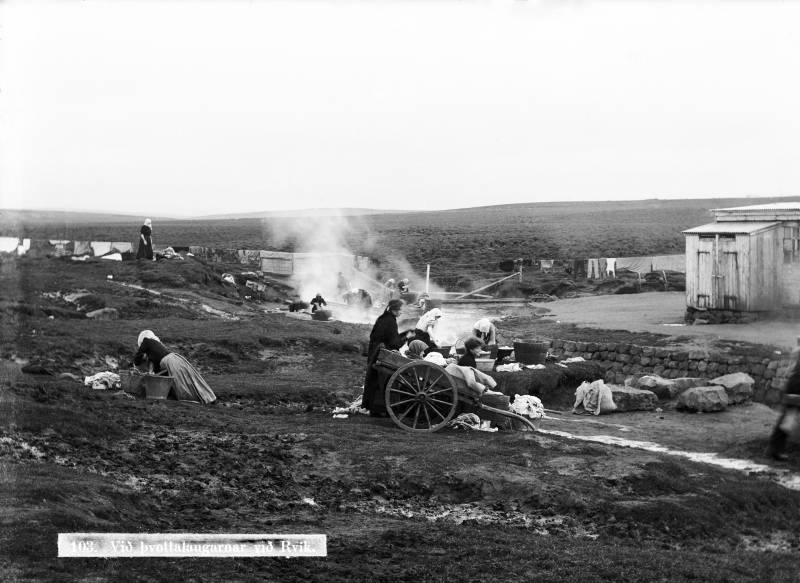The street Laugavegur derives its name from the fact that it used to lead to the hot springs in Laugardalur, where Reykjavík‘s citizens did their laundry up until the 1930s.
Housewife‘s and servants went on foot for almost 2 miles, carrying a heavy load of laundry and washing utensils to the hot springs, across rough and dangerous terrain. Women usually tended to this work alone, although men sometimes helped in need.
The way to the hot springs in Laugardalur was a treacherous one; crossing a fen and several small brooks which could swell to great rivers when it rained. A number of women injured themselves doing this work, and some even lost their lives falling into the springs – dying from burns they sustained from the boiling hot water or drowning. The construction of a road from the center of Reykjavík to the hot springs began in 1885, to make it easier for workers to transport laundry to the hot springs.
The poet Margrét Jónsdóttir (1893-1971) depicts the harsh reality of these hard-working women in her poem about Thórunn, the old washerwoman who did laundry for wealthy families, while she lived in poverty.
Old Thorunn
by Margrét Jónsdóttir
Old Thorunn the washerwoman
Plods along, stunned and cold;
Another day of aching toil
Is finally all told.
Before her, winter’s snow-white bolts
Of softest wool unfold.
Many of our finest ladies
Trust to old Thorunn’s brush;
Her work is wanted everywhere;
She won’t slack off or rush;
She’ll cross the bridge, she’ll climb the Slope;
She’ll come through rain or slush.
Swollen, knotted, bluish red hands,
Sloping shoulders, smarting feet,
That has long been Thorunn’s fashion
Plodding up and down the street;
From her headscarf stray locks dangle,
Long since gray, seldom neat.
Glance into the glittering brilliant
Color-spangled banquet hall:
Perfect collars, pure-white linen,
Choicest people, one and all,
So many sparkling, polished things!
“Be glad! Rejoice!” they call.
Old Thorunn came to scrub and shine
And then she spent the night
In her small hut that lacked a stove
And seldom caught the light;
Not many linens there, I think,
Got starched and pressed snow-white.
Was she ever young and blooming
Like the ladies on the Slope?
Did she have her own bright future,
Her loves, her faith, her hope?
Had she a right like you and me
To riches and broad scope?
Winter spreads its woollen homespun,
Winds the earth in clean fresh cloth,
Evens out, erases footprints;
Also yours, Thorunn, are lost.
Out of the clouds a crescent moon
Comes shining, pale and soft.
Translated by Sarah Brownsberger (unpublished)
